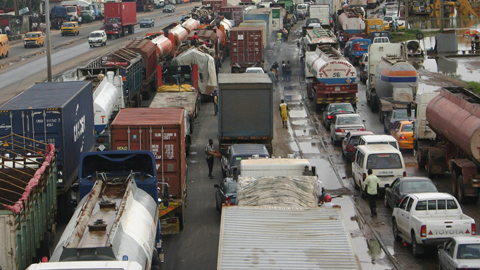The high volume of traffic which characterises Apapa and adjourning areas resurfaced weekend after truck drivers and operators suspended their 10-day strike and resumed evacuation of cargo from the nation’s seaports.
The truckers had embarked on the strike to protest the implementation of the Lagos State Traffic Law, which restricts their movement to nighttime – 9pm to 6am – within the Lagos metropolis.
Reports reaching SHIPS & PORTS DAILY indicate that the State Governor, Akinwunmi Ambode has directed security operatives to suspend implementation of the law till further notice.
Chairman, Association of Maritime Truck Owners (AMATO), Chief Remi Ogungbemi, who led the truckers to a meeting with officials of the Lagos State Ministry of Transport over the weekend confirmed the development.
“This is to inform you and appreciate His Excellency for relaxing the restriction order placed on movement of trucks within the metropolis.
“Also, we have discovered a strategy we’ll be using to guide against frequent falling of containers,” Ogungbemi told SHIPS & PORTS DAILY.
The government’s directive was necessitated by the need to stop further carnage on the roads in the wake of the accident involving a container carrying truck which fell off the Ojeulegba Bridge in Surulere, three weeks ago, killing three persons.
The resumption of the operations of the trailers is already aggravating traffic into Apapa, as motorists at the weekend had herculean task trying to enter Apapa from the Island.
The trailers took over the entire length of the Ijora Bridge, connecting Apapa from Ijora, such that other motorists, who drove on to the bridge hoping to connect Apapa, were forced to a standstill on the bridge.
It was also the same scenario on Sunday, as most of the vehicles heading for Apapa from the mainland and island, meandered through the bridge.
Officials of the Task Force on Apapa Traffic who had typically maintained order on the road were not in sight, thereby aggravating the situation.
Stakeholders believe the situation will be brought under control once the Task Force operatives return fully to work.
However, Ogungbemi has assured that the gridlock would clear within the next 48 hours.
He said that various stakeholders had been working tirelessly with the Nigeria Customs Service to clear backlog of trucks at the ports to allow vehicles to manouvre.
“Since the Lagos State Government relaxed the restriction of trucks to start moving in the day, accessing the ports had been difficult due to trucks trapped by the law.
“Trucks in the port have to go out for incoming ones, the Nigeria Customs Service have to clear the ones in the ports, hence the backlogs that locked down Lagos.
“I hope it will get better within 48 hours as stakeholders are working tirelessly to ensure free flow of traffic and we are sorry for the inconveniences,” he said.
Lagos Sector Commander of the Federal Road Safety Commission (FRSC), Hyginus Omeje however said the gridlock was a deliberate action by truck and trailer owners.
“The whole trucks and trailers that were supposed to go into the ports are lined up on the road in Apapa and other roads in the state.
“We have positioned our men in strategic places so that they do not take over the whole part of the road; they are lined up on one part of the road,” Omeje said.
A driver of one of the articulated vehicles, Akeem Olaosebikan however disagreed with Omeje’s assessment of the situation, claiming that the restriction order coupled with the strike which lasted for 10 days was the cause of the gridlock.
“I think the situation is because some trucks inside the port are unable to come out due to the time. Since the State Government has relaxed their order, I think some trucks will be finding their way out so that the gridlock will reduce,” Olaosebikan said.
Another truck driver, Adekunle Teslim, urged government to the port access roads.
“There are other roads leading to the Wharf but due to the bad state of the roads most trucks drivers concentrate on the Apapa-Orile axis.
“If government can repair Mile 2-Tin Can road, I think it will be better because it will reduce traffic on the Apapa route,” Teslim said.
Copyright Ships & Ports Ltd. Permission to use quotations from this article is granted subject to appropriate credit given to www.shipsandports.com.ng as the source.
